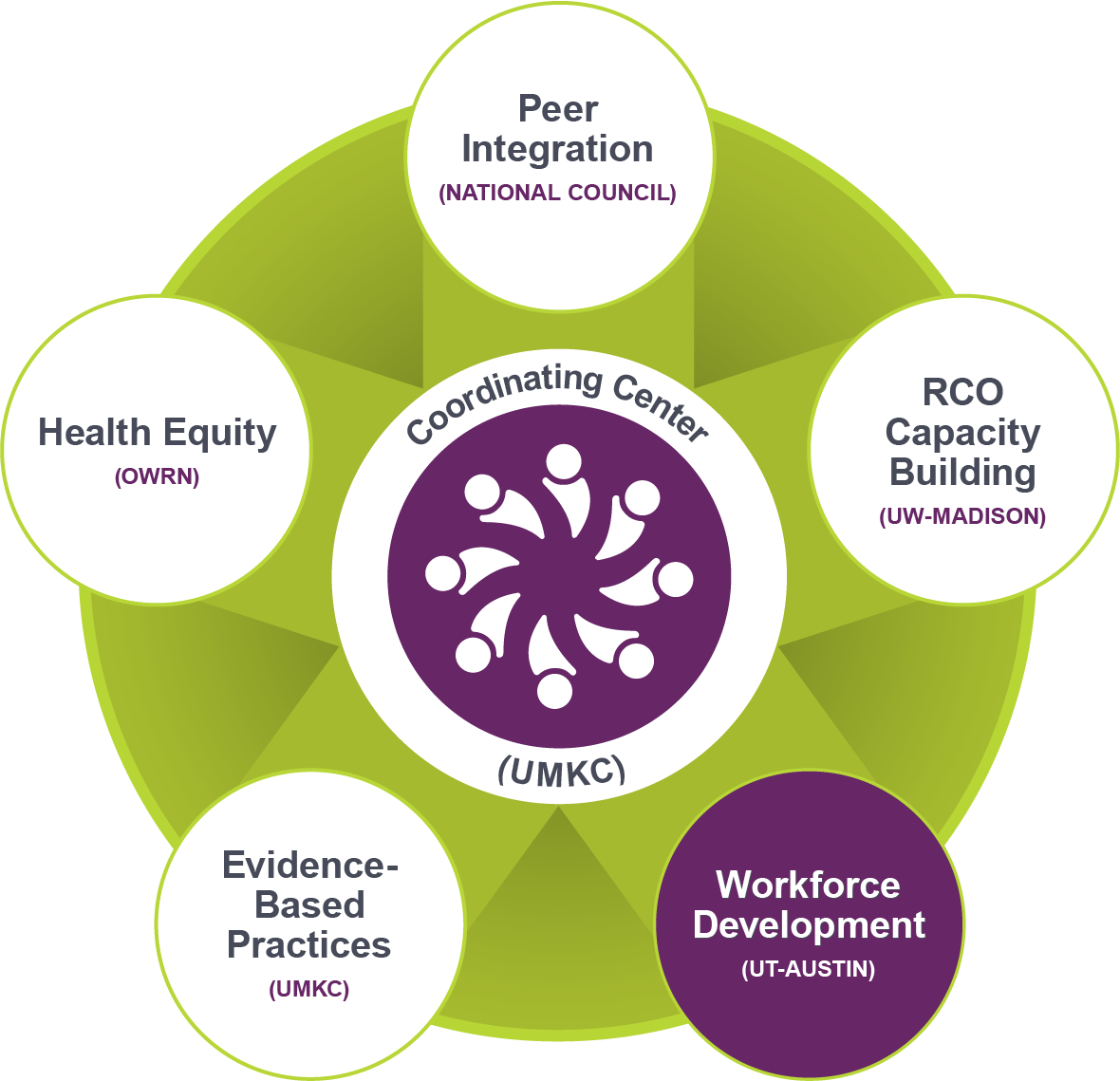Supporting the growth, advancement, and sustainability of the peer recovery support specialist workforce is a priority at PR CoE. Therefore, this core team engages in work around certification processes for peer recovery support specialists, equipping the workforce with the necessary skills to provide effective services, creating spaces for the workforce to connect, and workforce retention, among others.
Centering a focus area on workforce development is crucial for a variety of reasons. It creates the opportunity for peer recovery support specialists from across the country to develop skills and grow in a cohesive manner that few other organizations are able to support. Additionally, it provides resources for a growing workforce in order to ensure that peer services are implemented to fidelity. Lastly, focusing on workforce development offers legitimacy to the profession as peer recovery support specialists spread to work in diverse settings throughout the behavioral healthcare continuum.

“With roots in the consumer mental health movement, which worked to expand traditional mental health treatment, peer support has always been tied to a legacy of activism (Van Tosh, 2006). Formal peers validate distinctive emotional distress related to structural experiences of inequity and injustice (Beresford & Russo, 2015)”
Bakshi, S. (2021). Peer Support as a Tool for Community Care: “Nothing About Us, Without Us” . Columbia Social Work Review, 19(1), 20–43. https://doi.org/10.52214/cswr.v19i1.7602
Peer Support as a Tool for Community Care: “Nothing About Us, Without Us”
This article examines the ways in which frontline communities benefit from expanded access to anti-carceral formal and informal peer support as a mental health safety net that interrupts harm and prioritizes agency, consent, and self-determination. This paper broadens social work’s conceptualization of peer support through theoretical frameworks of anti-carceral social work, abolition, and intersectionality. Social work and its adjacent fields are called to urgently center Black liberation, collective healing, and community care by advocating for the integration of formal and informal peer support into mental health policy and practice. This paper strategically leans into a lineage of critical peer thought scholarship by utilizing footnotes and citations to model the ethical acknowledgment of peer labor within human rights movements. This intentional structure promotes radical solidarity that resists the exploitation of people with lived experience.
Curriculum or Toolkit
Peer Support Toolkit (City of Philadelphia DBHIDS)
This toolkit from Philadelphia's Department of Behavioral Health and Intellectual disAbility Services, is designed to support behavioral health treatment agencies with the process of integrating peer providers into their service settings. The Peer Support Toolkit incorporates many of the promising practices and resources that have emerged during the last decade of Philadelphia’s recovery-focused system transformation effort. Tools in this kit are designed to help agencies to recruit, retain, and effectively deploy people in recovery in a variety of peer support roles. The resources and information provided is relevant for executive leadership along with supervisors and peer staff.
Report
Hotline Peer Specialist Integration: Preliminary Considerations for Equity and Sustainability
Authors Kirill Staklo (he/him) and Nze Okoronta (they/them) provide an overview of the necessary information for the integration of Peer Specialists in hotline programming for equity and sustainability. Topics include intro to the peer role, medical trauma and minority stress, hotline work, informed consent and harm reduction, best practices in service establishment and training, and further resources.
Skill Development Series for Peer Recovery Support Specialists
The University of Texas-Austin houses the Addiction Research Institute and focuses on substance use recovery and long-term health and wellness. It has been the home of the Region 6 South Southwest ATTC for 25 years. UT has collaborated with the Texas behavioral health agency on planning, design, implementation and evaluation of the state’s transformation to a ROSC for SUD services. This initiative included development of local ROSC collaborations, TA for RCOs and existing SUD treatment providers in implementation of the recovery model and integration of peer recovery support services.
Peer Service Integration
RCO Capacity Building
Funding for this initiative was made possible by grant no. 1H79TI083022 from SAMHSA. The views expressed in written conference materials or publications and by speakers and moderators do not necessarily reflect the official policies of the Department of Health and Human Services; nor does mention of trade names, commercial practices, or organizations imply endorsement by the U.S. Government.